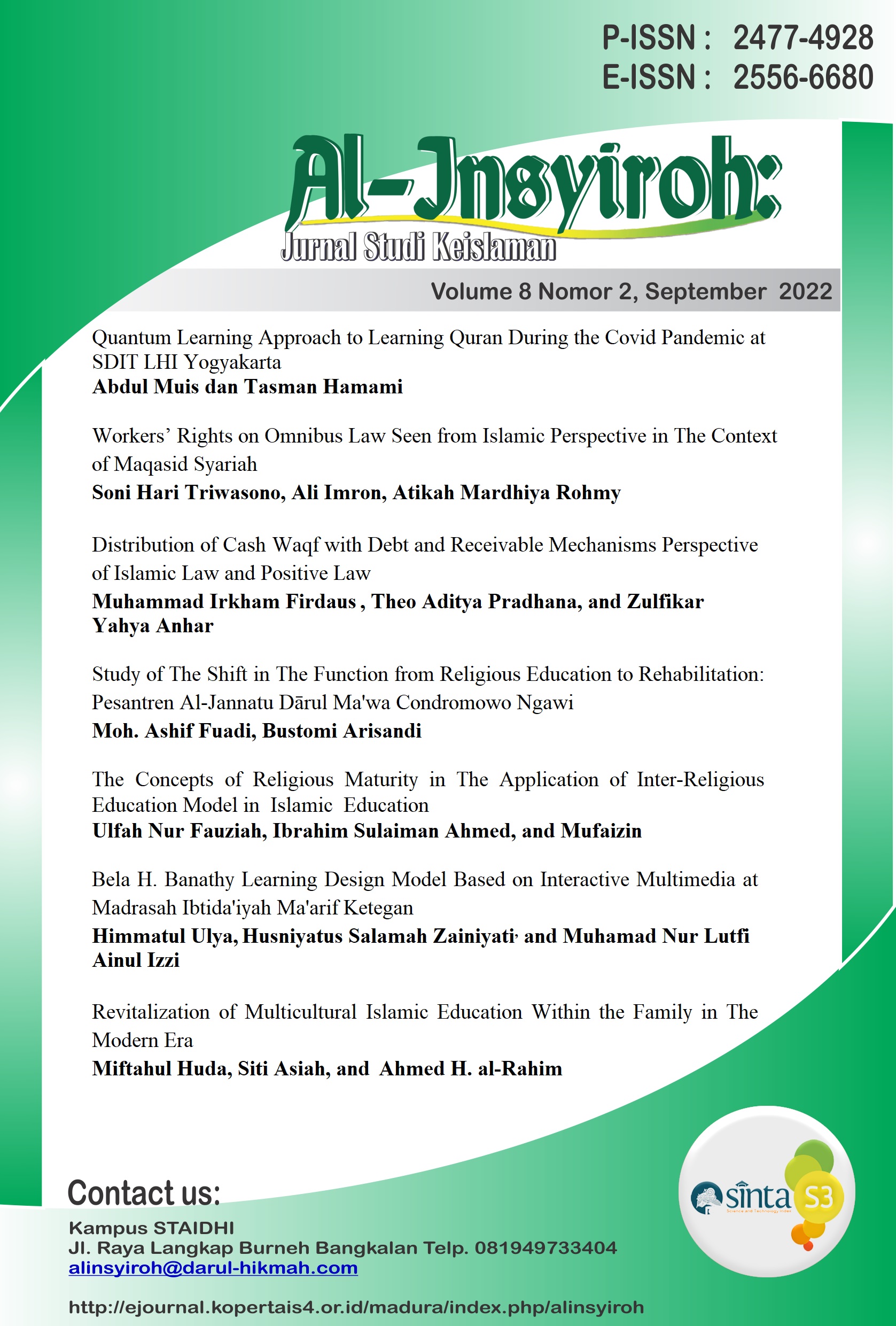Workers’ Rights on Omnibus Law Seen from Islamic Perspective in The Context of Maqasid Syariah
DOI:
https://doi.org/10.35309/alinsyiroh.v8i2.5476Keywords:
Labor Rights, Public Policy, Maqasid Syariah, Omnibus LawAbstract
This article discusses labor rights in the laws and regulations in Indonesia. In particular, regarding the rights of workers who are approaching retirement age. There are also laws that are the subject of discussion, namely Law Number 13 of 2013 concerning Manpower and Law Number 11 of 2020 (Omnibus Law). All of this is also discussed from an Islamic perspective. The focus is on the Maqasid Sharia concept, as an effort to protect religion, life, wealth/property, intellect/mind, and descendants or the next generation, from every individual on earth. Maqasid sharia always relies on the principles of justice and the welfare of the people. This study uses a qualitative method with a literature study approach. The results of this study indicate that there are a number of problems in the application of laws relating to employment in Indonesia. Especially, in the new law, namely, the 2020 Omnibus Law. The problems referred to include, among other things, the unclear working contract period, changes to the minimum wage provisions, complicated outsourcing rules, the concept of termination of employment, and ambiguous leave terms. The government must pay attention to these findings. Viewed from the perspective of Maqasid Syariah, the lack of clarity on the term of the employment contract, the provisions of the minimum wage, outsourcing, and termination of employment can be classified as endangering one's financial aspects (wealth). While the issue of leave often has a negative impact on a person's physical and mental health (life and mind). This study is expected to have theoretical benefits in the fields of employment, public policy, and Omnibus Law. There is also a practical benefit for readers is to open up insight about the problems around, in connection with the Omnibus Law. Keywords: Labor Rights, Public Policy, Maqasid Syariah, Omnibus Law  ÂReferences
Abdul Manas, Mohd Fazali, Abd Rahman Abd Ghani, and Mohd Noor Daud. “Aplikasi Maqasid Syariah Terhadap Pentafsiran Ayat Hukum Arak Dalam Tafsir Al-Azhar.†Sains Humanika 10, no. 3–4 (2018): 145–153.
Al-Ghali. Syaikh Al-Jamī‘ Al-A‘ẓam Muḥammad Al-ṬÄhir Ibn ‘AsyÅ«r; ḤayÄtuh Wa ĀṡÄruh. Beirut: Dar Ibn Hazm, 1996.
Al-Zuhaili. Ushl Al-Fiqh Al-Islâmi. Damaskus: Dar Al-Fikr, 1986.
Anderson, James E. Public Policy Making. New York: Holt, Rinehart and Winston, 1984.
Asyur, Ibnu. Naqd Al-’Ilmi Li Kitab Al-Islam Wa Usul Al-Hukmi. Kairo: Al-Salafiyah, 1925.
———. Usul Al-Nizam Al-Islamy Fi Al-Mujtama’. Tunisia: Syirkah Al-Tunisiyah Li Al-Tauzi, 1985.
Bakti, F, A Shomad, T P Usanti, and P Thalib. “The Urgency of Sharia Maqashid in the Development of Mudharabah Contract in Sharia Banking.†International Journal of … 9, no. 7 (2022): 266–275. https://ijmmu.com/index.php/ijmmu/article/view/3895%0Ahttps://ijmmu.com/index.php/ijmmu/article/viewFile/3895/3403.
Dahl, Robert A. Perihal Demokrasi. Jakarta: Yayasan Obor Indonesia, 2001.
Deski, Ahmad. “Maqasid Syari’ah Menurut Abdul Wahab Khalaf.†Al-Furqan 7, no. 1 (2022): 203–213.
Dye, Thomas R. Understanding Public Policy. New Jersey: Prentice Hall, 1972.
Effendy, Mansyur A. Kapita Selecta Hukum. Bandung: Widya Padjajaran, 2009.
Erawan, M. Aufar Saputra Pratama, Zaid, and Dewi Nurul Mustjari. “Optimalisasi Undang-Undang Cipta Kerja Pada Koperasi.†Jurnal Rechtens 10, no. 1 (2021): 59–74.
Firmansyah, Adithya Tri, Ema Sarila Sinaga, and Fenia Aurully Aisyah. “Hilangnya Sendi Demokrasi Dan Otonomi Daerah Melalui Korporatokrasi RUU Omnibus Law.†Widya Yuridika 3, no. 2 (2020): 131.
Juhari, J., & Masdar, M. (2015). Konsep Kepemilikan dan Usaha Dalam Islam. Al-Insyiroh: Jurnal Studi Keislaman, 1(1), 44-69.
Kartawijaya, Adjat Daradjat. Hubungan Industrial Pendekatan Industrial-Inter Disiplin. Bandung: Alfabeta, 2018.
Kholid, M. (2018). Praktik Akad Pembiayaan Gadai Emas Perspektif Hukum Islam. Al-Insyiroh: Jurnal Studi Keislaman, 2(1), 128-137.
Kurniawan, Fajar. “Problematika Pembentukaan Ruu Cipta Kerja Dengan Konsep Omnibus Law Pada Klaster Ketenagakerjaan Pasal 89 Angka 45 Tentang Pemberian Pesangon Kepada Pekerja Yang Di Phk.†Jurnal Panorama Hukum 5, no. 1 (2020): 73–86.
Maflahah, Ima Qimmatul. “Ketentuan Pengupahan Dalam Uu No. 11 Tahun 2020 Tentang Cipta Kerja Perspektif Fikih Siyasah.†Universitas Islam Negeri Syarif Hidayatullah Jakarta, 2021.
Manalu, Nelson, Martono Anggusti, and Janpatar Simamora. “Kepastian Hukum Manfaat Pensiun Menurut Undang-Undang No. 13 Tahun 2003 Dengan Undang-Undang Cipta Kerja No. 11 Tahun 2020 Klaster Iv Dan Peraturan Pemerintah No. 45 Tahun 2015.†Nommensen Journal of Legal Opinion 2, no. 02 (2021): 252–267.
Marijan, Kacung. Sistem Politik Indonesia: Konsolidasi Demokrasi Pasca Orde Baru. Jakarta: Kencana, 2019.
Marzuki, Peter Mahmud. Pengantar Hukum. Jakarta: Kencana, 2017.
Mashudi, M. (2018). Perilaku Dan Budaya Konsumen Madura Dalam Dinamika Etika Bisnis Syariah. Al-Insyiroh: Jurnal Studi Keislaman, 2(2), 133-149.
Muttaqin, I. (2015). Konsep Alâ€Kasb Dan Modernisasi Islam. Al-Insyiroh: Jurnal Studi Keislaman, 1(1), 23-43.
Nisa, Sayidah Khoirun. “Maqashid Sharia Concerning Sexual Violence Against Wife In Law Number 23 Year 2004.†QONUN: Jurnal Hukum Islam dan Perundang-undangan 6, no. 1 (2022): 68–81.
Pemerintah Indonesia. Undang-Undang 12/2011 Tentang Pembentukan Peraturan Perundang-Undangan. Jakarta, 2011.
———. Undang-Undang 13/2003 Tentang Ketenagakerjaan. Jakarta, 2003.
Rachman, Rio Febriannur. “Kebijakan Pendidikan Anak Berkebutuhan Khusus Di Surabaya Dalam Perspektif Islam.†Bidayatuna: Jurnal Pendidikan Guru Madrasah Ibtidaiyah 3, no. 1 (2020): 125–143.
———. “Optimalisasi Teknologi Informasi & Komunikasi Dalam Inovasi Surabaya Single Window.†Jurnal Khazanah Intelektual 6, no. 2 (2022): 1428–1441.
Razy, Muhammad Fakhrur, and Muhammad Fedryansyah. “Konflik Gerakan Masyarakat Sipil Dan Pemerintah Dalam Proses Penyusunan Rancangan Undang-Undang Omnibus Law.†Jurnal Kolaborasi Resolusi Konflik 2, no. 2 (2020): 74.
Riyanto, Sigit, Maria SW Sumardjono, Sulistiowati, and Eddy OS Hiariej. Kertas Kebijakan Catatan Kritis Dan Rekomendasi Terhadap UU No 11 Tahun 2020 Tentang Cipta Kerja, Edition 2/5 November 2020. Edited by Sri Wiyanti Eddyono. Yogyakarta: Law Faculty Universitas Gadjah Mada, 2020.
Rohidin. Pengantar Hukum Islam. Yogyakarta: FH UII Press, 2018.
S., Catur J., Djongga, Heriyandi, Herry Poerwanto, Jelita Hutasoit, Khairul Anam, and Bambang Wiyono. “Perlindungan Hukum Terhadap Kesejahteraan Pekerja Melalui Undang-Undang Nomor 11 Tahun 2020 Tentang Cipta Kerja.†Lex Specialis 1, no. 2 (2020): 178–188.
Sari, S. M., M. Salam, D. Sariani, and H. Usmanto. “Analisis Faktor Pendorong Mahasiswa Universitas Jambi Dalam Mengikuti Aksi Demonstrasi Omnibus Law.†Ilmu Pengetahuan Sosial FKIP Universitas Jambi 1, no. 1 (2021): 84–93.
Sihombing, Sihar. “Perspektif Perlindungan Dan Jaminan Kesejahteraan Pekerja Dalam Undang-Undang Cipta Kerja.†Jurnal Nalar Keadilan 1, no. 1 (2021): 16–29. https://jurnal.universitasjakarta.ac.id/index.php/jurnal-fh-unija/article/view/2/2.
Soekanto, Soerjono. Pengantar Penelitian Hukum. Jakarta: UI Press, 1986.
Soenaryo. Metode Riset. Surakarta, 1985.
Sukri, Indah Fitriani. “Implementasi Undang-Undang Cipta Kerja Terhadap Penyelenggaraan Sertifikasi Halal Dan Produk Halal Di Indonesia.†Majalah Hukum Nasional 51, no. 1 (2021): 73–94.
Syah, Ismail Muhammad. Filsafat Hukum Islam. Jakarta: Bumi Aksara, 1992.
Syathibi, A I. Al-Muawâfaqat Fi Ushul Al-Syari’ah. Beirut: Dar al-Kutub al-Ilmiyah, 2003.
UNDP. Good Governance; Telaah Dari Dimensi Akuntabilitas, Kontrol Birokrasi Pada Era Desentralisasi Dan Otonomi Daerah. Surabaya: Insan Cendekia, 2001.
Zed, M. Metode Penelitian Kepustakaan. Jakarta: Yayasan Pustaka Obor Indonesia, 2008.
Downloads
Published
How to Cite
Issue
Section
License
Copyright (c) 2022 Al-Insyiroh: Jurnal Studi Keislaman

This work is licensed under a Creative Commons Attribution-ShareAlike 4.0 International License.

This work is licensed under a Creative Commons Attribution-ShareAlike 4.0 International License.









